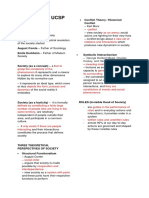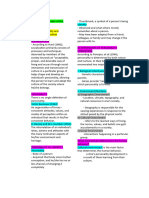0 ratings0% found this document useful (0 votes)
14 viewsCulture Exam Notes
Uploaded by
stephenjohn.bonocanCopyright
© © All Rights Reserved
Available Formats
Download as DOCX, PDF, TXT or read online on Scribd
0 ratings0% found this document useful (0 votes)
14 viewsCulture Exam Notes
Uploaded by
stephenjohn.bonocanCopyright
© © All Rights Reserved
Available Formats
Download as DOCX, PDF, TXT or read online on Scribd
You are on page 1/ 4
CULTURE:
Enculturation refers to the acquisition of one's native culture
Cultural diffusion the term for the process by which cultures change over time due
to contact with other cultures
Socialization describes the process by which people learn the norms, values, and
behaviors expected in their society
Social control theory suggests that deviance results from a lack of social bonds and
attachment to society
Xenocentrism is a view in culture which believes that fluency in using English
language is a way of measuring intelligence
Anthropology is the study of human physical culture
Cultural relativism - Believing that all cultures are equally valid and should be
understood in their own context
Example of formal social control: Laws and their enforcement
Ethnocentrism is the belief that one's native culture is superior than other cultures.
It invalidates other ways of life
Cultural Relativism believes that every culture is unique in its own way. It recognizes
and accepts the cultural differences between societies.
Social Science - The study of human societies and the relationships among
individuals within those
societies.
Disciplines of Social Science:
Anthropology - Derived from two Greek words, anthropos which means
“man”, and logos which means “study”.
- promotes a holistic study of humans
Sociology - Derived from the Latin word socius which means “companion”
and the Greek word logy which means “study of”
- study of human behavior in societal context
- Anthony Giddens “The study of human social life, groups, and society.”
Political Science - Political science comes from the Greek words: polis (refers
to the city-state in ancient Greece) and scire (to know)
- the study of governments, public policies and political processes, systems,
and political behavior
Power “the ability of person to make person B do what person B would not
otherwise do”
State - Is a political entity that consists of four elements: territory, government,
people, and sovereignty
Society - Individuals sharing a common culture, geographical location, and
government.
Elements of Society:
- social solidarity
- shared identity and culture
- common language
- large population
- definite geographical area
- political, economic, social organization
Social Solidarity - Members of the community live together for mutual benefit.
Shared Identity and Culture - The basis for patterns of action and behavior.
Common Language - Society is characterized by a common language.
Large Population - ability to sustain succeeding generations of members.
Culture - The set of beliefs, ideas, values, practices, knowledge, history, shared
experiences, and material objects.
Primary Categories of Culture:
- Material Culture - Physical or tangible objects produced, shared, and
utilized within society.
- Non-Material Culture - Intangible properties and elements of society that
influence the patterns of action and behavior of its members.
Vital Components of Culture:
- Symbols - Things that convey meaning or represent an idea.
- Language - A set of symbols that enables members of society to
communicate verbally and nonverbally.
- Values - Provide standards to what is right or wrong, good or bad,
desirable or undesirable.
- Norms - Shared rules of conduct that determine specific behaviors among
society members.
3 Types of Societal Evolution:
Biological Evolution - Refers to the process whereby organisms undergo
various genetic and physical changes.
Cultural Evolution - Human cultural change - changes in socially
transmitted beliefs, knowledge, customs, skills, attitudes, languages, etc.
Technological Evolution - Refers to the changes over time in technology
that give humans increased control over their environment
Ethnocentric Approach - The belief that one’s native culture is superior than other
cultures.
Xenocentric Approach - The belief that one’s native culture is inferior to others.
Relativistic Approach - Considers cultures as equal.
Cultural Relativism - Recognizes and accepts the cultural differences between
societies.
which believes that every culture is unique in its own way.
John Locke - a British Enlightenment philosopher
said that the human mind at birth is nothing but a blank slate or tabula
rasa
Socialization - Refers to the lifelong process of social interaction which people
acquire their identities and necessary survival skills in the society.
Political Socialization - a process which enables the development of citizens to
function effectively within a particular political system.
Internalization - refers to the process of accepting the social norms, attitudes, roles,
and values transmitted by people and social groups within society as one’s own.
Self-identity - refers to the establishment of a unique sense of identity and an
awareness of how it relates to their society and the world.
ENCULTURATION - Describe the process of being socialized into a specific culture.
AGENTS OF SOCIALIZATION AND ENCULTURATION:
Family
School
Peer Group
Mass Media
Religion and State
THE INFLUENCE OF MASS MEDIA:
Pluralist Model – portrays media as an ideological marketplace that enhances
debate and electoral choice.
Market Model – suggests that media reflects the views of the general
republic, and that media presents what they think the people want.
Dominant-Ideology Model - The influence of bias to link between media and
the political and social elite.
Elite-values Model - Recognizes media bias as a product of the personal views
of media professionals such as journalists, broadcasters, and editors.
FOUR CATEGORIES OF NORMS:
- Folkways - These are socially approved behaviors that have no moral
underpinning which includes a variety of actions that constitute acceptable or
expected behavior drawn from customs and convention.
- Mores - These are the norms related to moral conventions; these include
behaviors that are
considered acceptable in relation to religious practices.
- Taboos - These are behaviors that are absolutely forbidden in a specific
culture.
- Laws - Consist of the rules and regulations that are implemented by the state,
making them the prime source of social control.
CONFORMITY - refers to the process of altering one’s thoughts and actions to adapt
to the accepted behavior within his/her community.
THREE TYPES OF CONFORMITY:
- Compliance - Refers to the outward conformity to social pressure but
privately disagreeing with it.
- Identification - Refers to the individual adopting a certain behavior because it
enables him/her to have a satisfying relationship with the members of his or
her group.
- Internalization/ Acceptance - Involve both public and internal compliance of
the norms & standards imposed by the group.
DEVIANCE - defined as a behavior that elicits a strong negative reaction from group
members and involves actions that violate commonly held social norms.
Conflict Theory - Analyzes deviance in the framework of competing interests
between social groups and the maintenance of power among the elites.
Control Theory - Consider deviance as emerging because of inadequate social
controls.
Social Control - defined as any systematic means and practices used to maintain
norms, rules, and laws: regulate conflict; and discouragement of deviant behaviour.
Broken Window Theory - suggests direct relationship between social disorder and
deviance, and
that maintaining an appearance of order is sufficient to discourage deviance.
Human Dignity and Human Rights - refers to the idea that a person has the innate
right to be valued, respected, and treated well
You might also like
- Chapter 3 - Becoming A Member of SocietyNo ratings yetChapter 3 - Becoming A Member of Society53 pages
- Social Sciences Branches of AnthropologyNo ratings yetSocial Sciences Branches of Anthropology5 pages
- Lesson 3 - Becoming A Member of SocietyNo ratings yetLesson 3 - Becoming A Member of Society17 pages
- Rasa.: Gradually Become A Self-Aware and Knowledgeable Human BeingNo ratings yetRasa.: Gradually Become A Self-Aware and Knowledgeable Human Being2 pages
- Lesson 2 - Understanding Culture and Society0% (1)Lesson 2 - Understanding Culture and Society19 pages
- Ucsp Report 01 Becoming Member of Society Which I Do Not RecommendNo ratings yetUcsp Report 01 Becoming Member of Society Which I Do Not Recommend44 pages
- Understanding Culture Society and Politics SOC S211: Anthropos, MeansNo ratings yetUnderstanding Culture Society and Politics SOC S211: Anthropos, Means7 pages
- Understanding Culture Society and Politics SOC S211: Anthropos, MeansNo ratings yetUnderstanding Culture Society and Politics SOC S211: Anthropos, Means13 pages
- Becoming A Member of The Society 1ST FINAL UCSPNo ratings yetBecoming A Member of The Society 1ST FINAL UCSP5 pages
- Information and Database Quality Information and Database QualityNo ratings yetInformation and Database Quality Information and Database Quality239 pages
- Diversey Suma Multi d2 3l Cleaner ConcentrateNo ratings yetDiversey Suma Multi d2 3l Cleaner Concentrate2 pages
- Communicative Activities For Middle School Classroom PDFNo ratings yetCommunicative Activities For Middle School Classroom PDF3 pages
- History of Philadelphia International AirportNo ratings yetHistory of Philadelphia International Airport3 pages
- English A2.2 PCA - PUD 1ro BachilleratoNo ratings yetEnglish A2.2 PCA - PUD 1ro Bachillerato25 pages
- Print - SEALDAH (SDAH) - SILIGURI JN (SGUJ) - 6743112587No ratings yetPrint - SEALDAH (SDAH) - SILIGURI JN (SGUJ) - 67431125871 page
- Idiomatic Rust - Matthias Endler - FOSDEM 2018No ratings yetIdiomatic Rust - Matthias Endler - FOSDEM 201843 pages
- Update Relationship in Primavera P6 by Excel Help and ManuallyNo ratings yetUpdate Relationship in Primavera P6 by Excel Help and Manually5 pages
- Rasa.: Gradually Become A Self-Aware and Knowledgeable Human BeingRasa.: Gradually Become A Self-Aware and Knowledgeable Human Being
- Ucsp Report 01 Becoming Member of Society Which I Do Not RecommendUcsp Report 01 Becoming Member of Society Which I Do Not Recommend
- Understanding Culture Society and Politics SOC S211: Anthropos, MeansUnderstanding Culture Society and Politics SOC S211: Anthropos, Means
- Understanding Culture Society and Politics SOC S211: Anthropos, MeansUnderstanding Culture Society and Politics SOC S211: Anthropos, Means
- Introductory Sociology CLEP Quick Prep SheetFrom EverandIntroductory Sociology CLEP Quick Prep Sheet
- Information and Database Quality Information and Database QualityInformation and Database Quality Information and Database Quality
- Communicative Activities For Middle School Classroom PDFCommunicative Activities For Middle School Classroom PDF
- Print - SEALDAH (SDAH) - SILIGURI JN (SGUJ) - 6743112587Print - SEALDAH (SDAH) - SILIGURI JN (SGUJ) - 6743112587
- Update Relationship in Primavera P6 by Excel Help and ManuallyUpdate Relationship in Primavera P6 by Excel Help and Manually

























































































